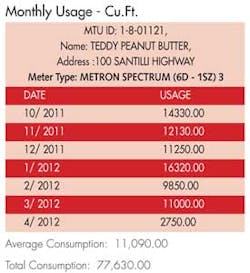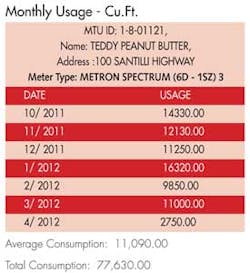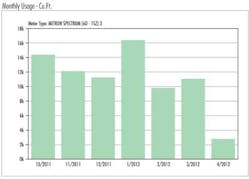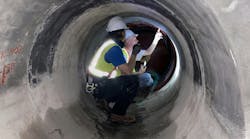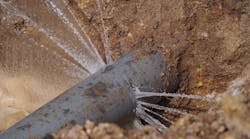By Ginger Barrett, Water Superintendent
The City of Somerville, MA, is located just north of the City of Boston, has a population over 75,000 and a land mass of only 4.1 square miles. It is the most densely populated community in New England. The Department of Public Works (DPW) Water and Sewer division is responsible for water delivery to approximately 14,000 residential, commercial, industrial, and institutional accounts every day. Water is delivered to the City from the Massachusetts Water Resource Authority (MWRA) via seven metering stations and redistributed to city water customers through 121 miles of distribution mains, some dating back to 1868.
Keeping track of the water distribution is of the upmost importance and having a fully functional metering network is critical to efficient operation. In 2005, and some 15 years after the last major residential metering project, water losses were increasing as was public discontent. The older touchpad system was starting to fail and the larger commercial and industrial meters were lacking routine maintenance. Commercial water customers' ownership of their meters did not help matters, as these customers had no incentive to insure the meters were working correctly. Non-revenue water had now reached the level of 18% representing millions of gallons of water and hundreds of thousands of dollars worth of lost water sales or unrecoverable cost. Erratic water bills caused the public voice to get louder and undesirable articles started to appear in the local press. Action was needed to get the department metering and data collection back on course, improve water accountability, and restore public trust.
Water Superintendent at the time, Ms. Carol Antonelli, called on the oldest meter service firm in New England, Mass Installation Inc. (MII), to help determine the extent of problems. A small contract issued in late 2005 was for the survey and evaluation of the commercial accounts as Ms. Antonelli was sure the City had problems with those meters.
MII found several problems with the commercial meters and provided a summary report in late 2005. Some of the discovered problems were of prompt concern as it was obvious the meters in service were incapable of recording the flows properly and costing the City of Somerville many lost revenue dollars. It was at this time the City made the decision to take over control of the commercial water meters and revised its written water meter standards. Then, in early 2006, the City issued a RFP for a Commercial Water Meter Replacement, Repair, and Maintenance project. Mass Installation was the successful bidder.
One of the options offered by MII that intrigued the City was the application of Metron-Farnier Single-jet style meters. This meter had been in service for many years at both Worcester and Springfield, Mass., and had proven to be a dependable, long-term performer. Further, the meter did not require an upstream strainer or straight pipe; two of the problems with other vendors' products that would have greatly increased in installation costs to the City.
The initial impact of the Metron SJ meters was nothing short of startling. While a few of the meters where estimate reads had been applied created a decline, the water and revenue gain for just 20 of the commercial accounts was showing nearly a $250,000 annual revenue increase. Other non-profit accounts (churches and schools) where meters were lacking were now being metered and the water accountability figures were properly assessed. Nevertheless, while the early performance was impressive, it still was not enough.
During this same period, the City had been piloting a new meter reading process for the residential accounts; a drive-by radio read system. Early indications of the drive-by system were promising, but Ms. Antonelli wanted to consider other options. Working with MII, the City was able to pilot the KP Electronics Fixed Base AMR (automatic meter reading) system for the commercial meters. The KP system only required a minimum number of RF repeaters and was perfectly suited for the Somerville system.
KP meter transmitter units (MTU's) were quickly adapted to the commercial meters and showed tremendous improvement over the drive-by radio read system. The system was so successful, the City utilized the services of MII to expand its use to a small quantity of residential and light commercial accounts (1½" and 2") to better assess customer water usage on a daily basis. This process proved very valuable in analyzing how City customers were using water and gave direct input to the next phase of work for the City; system-wide expansion.
By mid-2007, the success of the Metron-Farnier SJ meters and the adaptation of those meters to the KP system became very evident. With less than half of the City commercial meters considered, the City was looking at a positive revenue increase of more than a million dollars per year. This increase alone would be significant enough to offset the costs of converting the entire Somerville system to new water meters and on a fixed base system. An added benefit would be the restoration of public confidence and knowing every customer would be able to get a true meter reading and an accurate water bill.
Presentation was made in late 2007 to the honorable Mayor Joseph A. Curtatone of the necessity to expand the metering project and restore the City metering system to an acceptable level of operation. Mayor Curtatone became a strong supporter of the project and pushed forward plans to gain funding needed for system-wide expansion.
Ms. Antonelli and Ms. Jean Anguillo, also with the City of Somerville Water and Sewer Division, began to gather information needed to make a public solicitation. The City hired Weston & Sampson Engineers of Peabody, MA, to assist with developing specifications for the pending project and guide the City through the bidding/RFP process. The decision was made early to purchase water meters separately to improve meter prices.
In February 2008, Elster AMCO Water Meters of Ocala, FL, was the successful bidder for water meter sizes 5/8" through 2". At this time, the larger meter settings had nearly all been completed with the Metron SJ meter along with a few Neptune Compound and Turbine type meters still in service.
In June of 2008, an RFP was produced for the City-wide metering project. With several components of the KP AMR system in place from the pilot, it was hoped a continued expansion would be in order. Additionally, it had become obvious that water losses with the residential base were still climbing, so a relatively short period was required for the successful contractor to complete the project. In August of that year, the project was awarded to Mass Installation for full expansion of the KP AMR system, continued installation of the Metron SJ meters, and installation of the Elster AMCO meters at nearly 13,500 residential and light commercial accounts. MII was given one year for substantial completion.
As of September 2009, Mass Installation, Inc. had completed the installation of 13,812 of 13,873 active accounts, or 99.6% of all active accounts at the City of Somerville. Through 2010, 2011 and to date, MII continues to help the City for maintenance services on an as-need basis.
The City of Somerville metering program has been a huge success. Water and sewer revenues have improved substantially with just the new, commercial meters bringing over $1 million a year of additional revenue. Water loss has dropped from 22% down to 16%. Customer confidence has been restored and customer complaints have dropped dramatically.
About the Author: Ms. Ginger Barrett joined the Somerville staff in 2005 with more than 20 years of municipal government service both at the Town of Ipswich and with the Boston Water and Sewer Commission.
